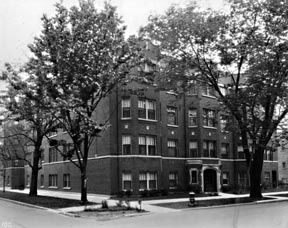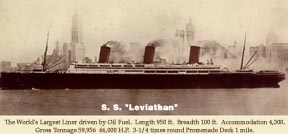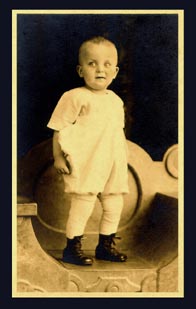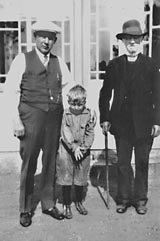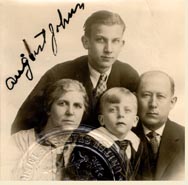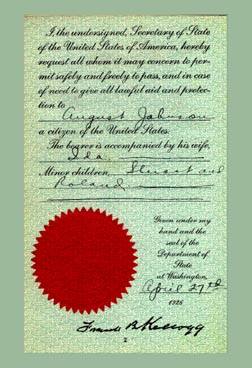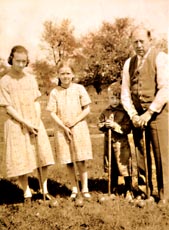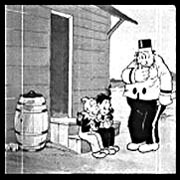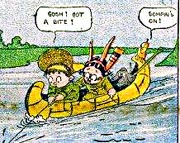|
|
|
|
|
|
Charles Roland August Johnson — AKA “Pleto” — Appears
The scene is the near north side of Chicago, Illinois and the date is May 2, 1920. The precise location is the Grant hospital. There's an open window in the hospital, and a huge bird is hovering near the hospital. When said bird spots the open window, it flies in and enters the room occupied by one Ida M. Johnson. The bird deposits a precious bundle in Mrs. Johnson’s bed and departs. The bird, of course, was a stork, and the precious bundle was me — one Roland August Johnson. So began the unadventurous life of one Swedish Lutheran boy, who, when he was christened, was given an additional name of Charles. Now my name is Charles Roland August Johnson and for reasons known to absolutely no one, absolutely no one, I was also tagged with the one-of-a-kind nickname of Pleto. I was born the son of August William Johnson, age 52, and Ida Mathilda Carlson Johnson, age 48. When I was brought home from the hospital to North Glenwood Avenue on the North side of Chicago I was greeted by my sister Sonja, age 17, and my brother Stuart, age 12. Another sister, Grace, would have been 9 years old, but she was a victim of the influenza epidemic and she passed away at the age of 6 years in 1917, before I was born.
Early Recollections
My very first recollection is riding a little three-wheeler trike in the backyard of the apartment house in which we lived on Glenwood Avenue. My next recollection is visiting a bungalow being built at 6115 N. Paulina Street in Chicago. I remember wandering through this partially-completed house and learning that this was to be our new home. We moved into this “palatial” bungalow after it was completed in the Fall of 1925. I am now five years old and I have many memories of this house. At the time that my father was building it, he also purchased a parcel of land exactly one block North of our home, at the corner of Granville Ave. and Paulina St., and here he proceeded to build a 22-flat apartment building. At approximately the same time he purchased a lot and built a summer home in Cedar Point Park in Williams Bay Wisconsin on beautiful Lake Geneva. As you will see later on in this rather dull epistle this move would have a very terrific impact on my life in later years.
Even with all of these property purchases in 1925 and 1926, my father now went out and bought a very deluxe Packard automobile. He then proceeded to book passage on the S.S. Leviathan, the most deluxe ocean-going liner of its day, for all five of the Johnsons for a 90-day trip to visit his family and relatives and my mother’s family and relatives in Sweden. Not bad for an immigrant Swede who came to the United States, and opened a “Ma ‘n' Pa” grocery store on Roscoe street in Chicago.
My mother, father, brother, and sister took many side trips through the Scandinavian countries during this vacation, but they left me — a six-year old — to stay with my uncle and his family. The interesting thing here is that neither my uncle nor my aunt or any one of their family or neighbors could speak English, so in order to get along I had to learn to speak Swedish. At six years of age this wasn’t too difficult a task. After just a short while, I was speaking Swedish just like a native.
My father and mother worked many long and hard hours each day in their grocery store, and he finally retired at the age of fifty years. So you see, I never knew my father to have a job; he was retired when I was born. 1927 and 1928 were great years. The economy of the country was at a very high peak and the Johnson family was living high on the hog. I had a great many friends in the neighborhood and I have kept in touch with many of them for years and years.
Life Crashes Down
The year is now 1929 and I can recall quite vividly waking one morning and coming down from my bedroom for breakfast to find my mother and father sitting together in the living room holding hands and crying. The stock market had crashed, the banks had closed, and for all intents and purposes the Johnson family had lost everything — I mean everything. We were BROKE. In the earlier years prior to this crash, which resulted in a world-wide depression, my father had invested in many parcels of real estate and now he had lost all of these. He did, however, manage to salvage the home on Paulina St., the apartment building at Granville and Paulina, and fortunately the summer home in Lake Geneva. My brother, who was a sophomore at the University of Illinois, had to return home — lack of funds — but my sister, who had been married in 1927, seemed to fare OK in that her husband Francis Carlborg had a “secure” job at a local bank.
The Carlson Family
For all intents and purposes my father did not have any relatives in America. This was not true, however, of my mother. My mother was one of many Carlson sisters who migrated from Sweden to the Chicago area. All of them at one time or another worked as maids for the wealthy Chicagoans. The Swift meat packing family was one of the places that seemed to always have one or another of the “Carlson” girls as a maid. My mothers’ sisters and all of their families lived in the Chicago area and were the hub of our social life for years. We would gather at each others’ houses for holiday celebrations — Christmas, Thanksgiving, Easter, Fourth of July etc. etc.
There was her sister Belinda (Linda) Borg, her husband Louis, and children, Lillian and Lester; there was her sister Maria Hultberg, her husband Claes, and children Arthur, Vivian, Robert, and Harold; there was her sister Alma Dahlstrom, her husband Charles and children Marian, and Myrtle; her sister Amanda Clauson, and children Hjalmar, Elsa, and Alice; and her sister Gerda and Henry Sundmark. You can see that I was never lacking for aunts uncles or cousins. All of the above cousins were anywhere from 12 to 19 years older than I was, except for Harold Hultberg. As a matter of fact, Harold was about three months younger than I was and we became the very best of friends. As I am writing this, Lester Borg, who now resides in Fort Lauderdale Florida, and I are the only surviving members of the whole Carlson “slect” (this is a Swedish word we used to describe ourselves and I guess it means relatives). When I say “surviving members,” I mean the aunts uncles and cousins. There are of course many many second cousins.
Back to the story of life of Charles Roland August Johnson AKA Pleto.
My Friends
My very early life saw me with one good friend and that was Petey Schmidt. Petey’s father was a cobbler and Petey lived with his family on Clark street and they lived above the cobbler’s shop. One of the reasons we were such good friends was that we were the same age, plus we lived in the same block and didn't have to cross any streets to be able to play together. When we got older and could cross streets without our parents’ aid we expanded to other territories.
I had many many friends, and I had trouble understanding why the fathers of all of my friends had jobs working from 8-5, while my father was always at home and never had a job. I didn't appreciate the fact the he had made his “fortune” and was now retired. I should have been proud, and now these many years later I'm as proud of my father and mother as one person could be.
While I did have many friends in the “Neighborhood,” I could hardly wait until after school on Fridays when we would all pile into the Packard automobile and head for “the lake.” We always referred to our summer home at Lake Geneva as up at “the lake.” One of the things that I recall about our rides to “the lake” in the Packard, was how my father would grip the steering wheel as tight as he could, and announce with such great pride “we're almost up to 65 miles per hour now.” Then he would ease off on the gas pedal and we'd slow down to our normal 45 miles per hour.
Our Lake Geneva Home
Let me tell you about our home at “the lake.” This house, built in 1926, was a four-bedroom house — no hot water, no bathtub, no central heat; air conditioning had not been invented. Each room was assigned!! On the second floor my mother and father had the master bedroom. My sister and her husband and their two children Frankie and Betty had one bedroom; I had one little cubicle called a bedroom, and on the first floor my brother, Stuart had his own palatial bedroom. There was one “bathroom” to accommodate all of us.
We, along with almost all of the other neighbors in Cedar Point Park, would take our baths by taking bars of soap to “the lake” and bathe. After “bathing” we would then take our bars of soap and store them in special places under the pier, until the next bath time.
Our next door neighbors, The Hammerschmidts, were our wealthy neighbors; they not only had a basement but had a telephone, an unheard luxury in Cedar Point Park. We could use their telephone in case of any emergency. Electric refrigeration was unheard of. We all had ice boxes and every day Babe Johnson the ice man would drive by and deliver 25, 50, 75, or 100 pounds of ice — whatever was required for our ice box. We didn't know any better and we were as happy as larks. If hot water were needed for shaving, or medicinal purposes, or some other purposes, we heated it on our kerosene-fueled kitchen stove. It might sound a bit primitive now, but to me, it was heaven.
It was in the summer of 1927 that I met Albert Leon Canfield. Al would spend the summers living at his uncle’s house. His uncle was Richard Hammerschmidt and was one heck of a nice guy. Even though almost all of the automobiles during this era were black, Al's Uncle Rich had a maroon Ford. WOW!!! During the summers and until late September, Al was always one year older than I was. In September, his birth date, he became two years older than I was. That remained until the following May 2nd when he would — once again — be only one year older. Al and I became the very best of friends and we still are as of today. Today Al is a widower lives in Connecticut and has one son named Richard Justin Canfield. Al and I keep in touch on a pretty regular basis.
The Katzenjammer Kids on The Louise
Al's uncle Rich Hammerschmidt used to call us the “Katzenjammer Kids.” For those of you aren’t familiar with the Katzenjammer Kids, they were two mischievous imps, who were cartoon characters in the Sunday “funny” papers. He'd say “what one doesn't think of the other does.” Al and I were always “going into business” at one time or another, and usually we only got as far as printing letterheads and calling cards. We used to call ourselves “CANFIELD AND JOHNSON, Producers, Promoters, and Agents — Anything from a Picnic to a Worlds Fair.”
Anyhow, in our “Hey Day” we organized a club we called the Lupus. Lupus, as we knew the word, meant wolf and what better name for a bunch of young, red-blooded American boys who used to run around tormenting the young red-blooded American Girls. One summer — probably the summer of 1934 — Al and I rented one of the excursion boats, The Louise on Lake Geneva, and sold tickets for fifty cents each to join “The Larruping Lupus, aboard the Luxurious Louise for a Moonlight Cruise on Lovely Lake Geneva.” I don’t know how much money we made, but the cruise was sold out!!
This was truly an exciting cruise. We provided a punch, which, of course, someone immediately spiked. Here again, dates were not the norm. Guys and gals all came stag, but maybe they didn't stay that way all evening. It was not our job nor duty to check on those things.
Lake Geneva has some twenty six miles of shore line. This cruise was to last two hours. It took us from Williams Bay to the city of Lake Geneva and back. At least that was the plan. Half way back from the city of Lake Geneva we ran into one heck of a storm and the “Captain” of our ship didn't know how to cope. There were no such things as radio or telephone communication from ship to shore. So, in order to avoid any catastrophe which might endanger the lives of the Lupus and their gang, the captain pulled into a harbor for safety and took up temporary mooring at a pier. The pier was the pier of one Mr. William Wrigley, of Wrigley chewing gum fame. Mr. Wrigley, himself, came down to see what was what, and of course we were all in awe of being in the presence of celebrity. He was a neat guy, down to earth, and told us to stay as long as necessary. When the weather cleared we went home, ecstatic with the “bonus” of having talked to Mr. Wrigley.
Another Venture: a Barn Dance
Our next venture was to rent a barn from a local farmer, hire an orchestra, and sell tickets for a barn dance. There was a hitch. In order to get the band to play we had to locate a piano. We went from house to house asking if we could borrow a piano for this dance. Believe it or not, one family agreed. Al and I rounded up a truck along with six other guys and we went into this house, carried out the piano and delivered it to the barn. The next day — using the same truck and the same six guys — we brought the piano back. All this and Al and I were about fourteen or fifteen years old.
Weekends and summers at Lake Geneva sort of put a crimp in any of my extra curricular activities at both grade school and high school. While I attended Hayt Grammar school (how do you like that for a name of a school?) I played bugle in the drum and bugle corps. I was active as a Boy Scout, troop number 818 at Ebenezer Lutheran Church, and I would guess that comprised my “extra curricular acitivites” while away from “the lake.”
1932: Twelve Years Old
The depression had taken such a toll on our family that my parents were forced to sell the palatial home at 6115 North Paulina Street and move into a five-room apartment in the apartment building we owned, at Granville and Paulina. This was quite a comedown for me and I didn't quite understand what had happened. While my sister had married and did not live with us any longer, there were still four Johnsons living in a two-bedroom apartment, with one bath. This was definitely a comedown. To further make things worse, my father had now taken over the janitorial chores of this building, and as a twelve year old, I had to come home every day after school and take the garbage from each of the 22 apartments down into the basement, and burn it in the furnace.
End Section 1: Go On to Section Two
|
|
|

